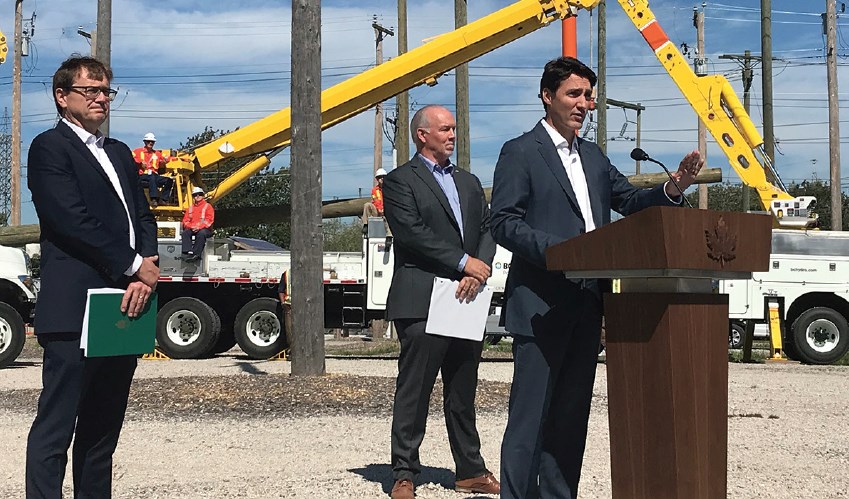In the coming weeks leading up to the October 21 federal election, there may be an opportunity for Prime Minister Justin Trudeau to don a hard hat, pick up a shovel and turn sod on the Trans Mountain pipeline expansion project.
Trans Mountain Corp. plans to resume work on the twinning project this fall. (It’s not clear whether last week’s decision by the Federal Court of Appeal to hear yet another challenge will further delay that resumption.)
Despite its potential political windfall for Trudeau, Marvin Shaffer, an adjunct professor of public policy at Simon Fraser University, doesn’t think it will earn the prime minister many points in Alberta.
“I don’t think he will get much credit, even if credit is deserved to some degree, just because of the hostility to the government there,” Shaffer said.
The Trans Mountain pipeline expansion and the $40 billion LNG Canada venture are two major energy projects in Western Canada that Trudeau can point to as accomplishments under the energy file.
Otherwise, from the energy industry’s perspective, that file is a boneyard.
In two years, under the Trudeau government’s watch, $100 billion worth of energy projects were killed, cancelled or stalled, according to a C.D. Howe Institute report released last year.
During Trudeau’s tenure, global energy majors like Royal Dutch Shell, ConocoPhillips(NYSE:COP) and Statoil – now called Equinor(NYSE:EQNR) – divested roughly US$30 billion worth of Alberta oilsands assets, according to Bloomberg News.
At a time when capital spending in oil and gas increased 38% in the U.S. (2017), spending in Canada’s oil and gas sector fell 56% over three years, according to the Canadian Association of Petroleum Producers.
The Trudeau government’s approach to energy was an attempted balancing act – developing Canada’s resources while addressing environmental concerns and climate change.
In a bargain with Rachel Notley’s Alberta NDPgovernment in Alberta, the Trudeau government promised new pipelines in exchange for ambitious climate change policies.
Trudeau killed the Northern Gateway pipeline project but approved the Trans Mountain and Line 3 pipeline expansions. Line 3’s expansion is still held up, but that is due mostly to regulatory delays in the U.S.
Trudeau can at least point to the Trans Mountain expansion as a fulfilled election promise, although it came at substantial financial and political costs.
The Trudeau government lost a key ally when Jason Kenney’sUnited Conservative Partyunseated the Notley government in the 2018 Alberta provincial election, undoing some of her government’s key climate change measures.
The Trudeau government’s unwillingness or inability to exert federal authority over a recalcitrant BC NDPgovernment, which threatened to use every tool available to block the pipeline’s expansion, prompted Kinder Morgan Canada(TSX:KML) to announce that, like TC Energy(TSX:TRP), which cancelled the $12 billion Energy East pipeline project, it was pulling the plug.
The Trudeau government stepped in and bought the Trans Mountain pipeline for $4.5 billion and committed to financing its expansion.
But the energy industry viewed the purchase as a tacit admission that the regulatory, legal and political climate in Canada is sclerotic and risky.
As for other energy projects, Trudeau was on hand to take some credit in October 2018 when the partners behind the $40 billion LNG Canada project were in Vancouver to sign the project into reality.
The Trudeau government agreed to waive 45% tariffs on fabricated steel imported from China and South Korea – something that could have added hundreds of millions of dollars to the project’s costs. More recently, it announced $275 million in funding for LNG Canada to help defray costs of high-energy gas turbines.
Trudeau also recently announced joint funding of $680 million worth of electrification projects to reduce the carbon profile of B.C.’s natural gas and LNG sector.
Despite progress on LNG Canada and the Trans Mountain pipeline expansion, the Trudeau government can expect the Conservatives during the election campaign to accuse it of being no friend of Alberta or the oil and gas sector.
And the prime minister will face charges from the federal NDPand the Green Party of Canadathat he is no friend of the environment, because “climate leaders don’t build pipelines.”
Critics of Trudeau’s oil tanker moratorium for northern B.C. and revamp of the Canadian Environmental Assessment Act and National Energy Board(NEB) through Bill C-69 warn that the Trans Mountain pipeline may be the last one built in Canada.
Even Notley, a Trudeau ally, criticized Bill C-69, which is a considerable rewriting of Canada’s environmental and regulatory review processes that has generated significant backlash from Alberta, industry and business associations.
Conservative Leader Andrew Scheerhas vowed to scrap Bill C-69, as well as Bill C-48, which would ban oil tanker traffic on B.C.’s north coast, should the Conservatives form the next government.
As for clean energy, the Liberal government in its last budget earmarked $1.4 billion over four years for various incentives.
The NDP is pledging investments in renewable energy to achieve carbon-free electricity in Canada by 2030 – something that would require the phase-out of coal and natural gas power, which generate 19% of Canada’s power.
The Green party likewise is promising to “remove all fossil fuel generation” from Canada’s grid by 2030.
The Conservative party’s platform makes no such promises but is the only one that mentions nuclear power as a potential source of emissions-free power generation. •



